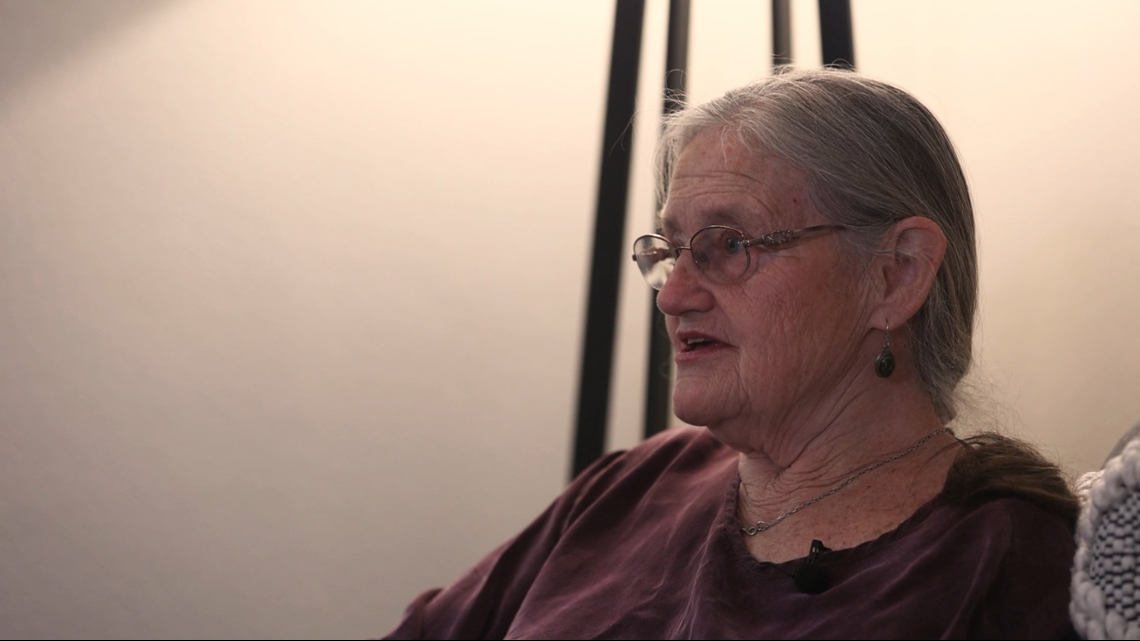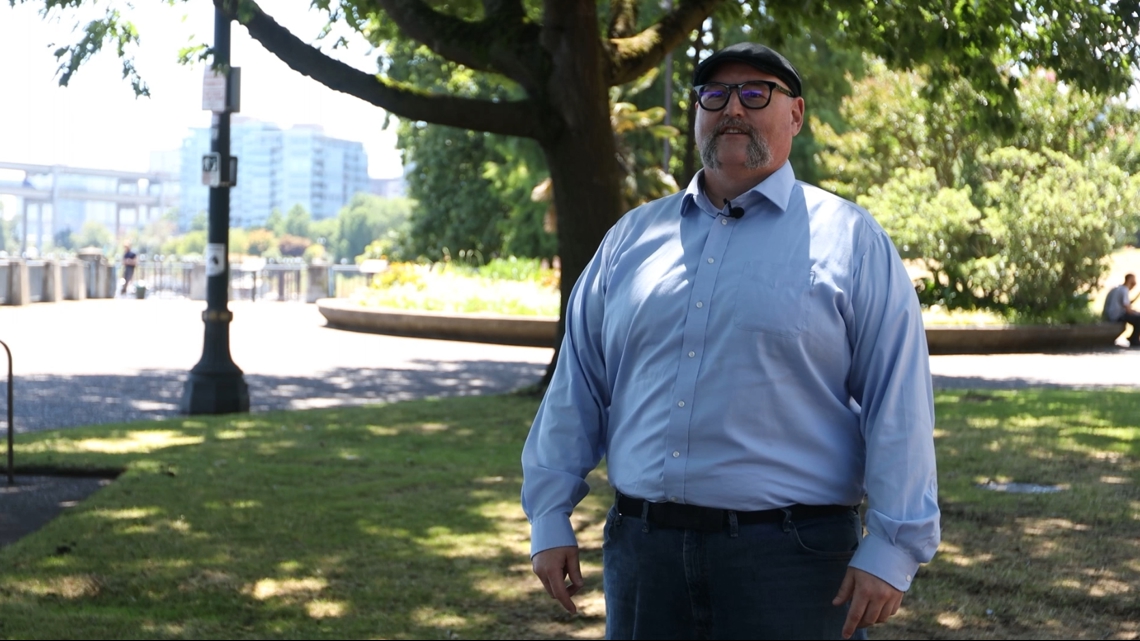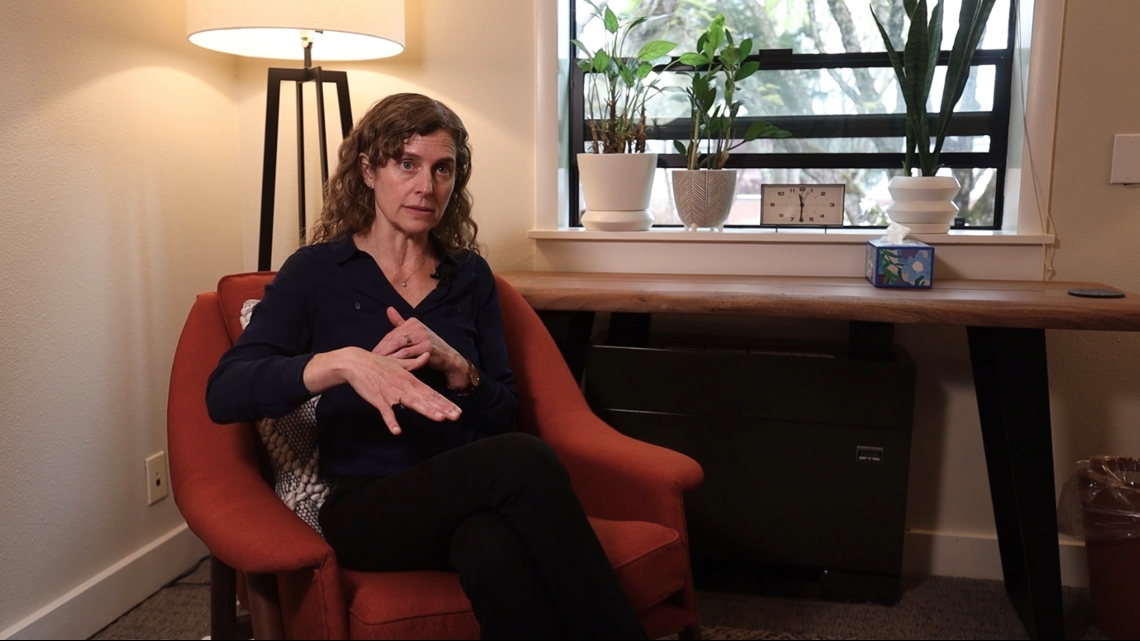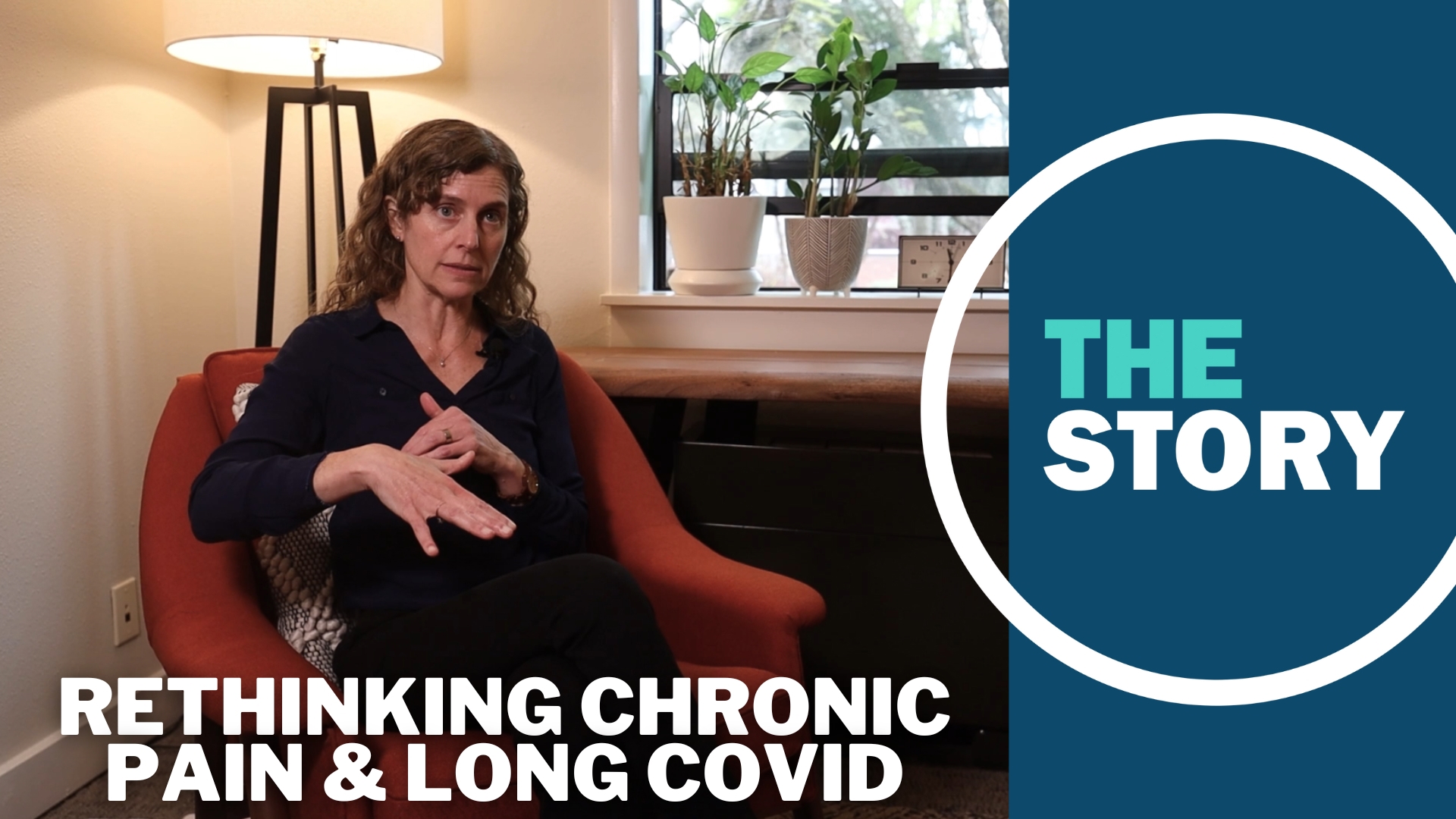PORTLAND, Ore. — A Portland doctor has joined a national movement aimed at treating pain that has no obvious cause. Dr. Rebecca Kennedy formerly led the long COVID program at Kaiser Permanente in Portland; now she's out on her own and on the leading edge of what could be a revolution in medicine.
When The Story's Pat Dooris first met Kennedy, she was still focused on untangling the puzzle of long COVID for Kaiser patients. These days, she's helping patients like Deborah Thomas figure out what's going on with her body — and more importantly, her brain.
"So you had this incredibly profound fatigue. You had brain fog, vision changes," said Kennedy.
That wasn't all, according to Thomas. She had changes to her skin, her digestion, her sleep, even her breathing.
"And for me, the worst was feeling like I'd lost my mind — because I can put up with a lot if I get to think about it," Thomas said. "But I couldn't think clearly."
Thomas is 75 years old. Before the COVID-19 pandemic, she was healthy and active. She lives in the Portland area and agreed to let The Story record her check-up with Kennedy.
In 2020, Thomas got COVID. The infection developed into long-haul COVID, the mysterious set of lingering symptoms some share of patients have dealt with for months or years after getting sick. Thomas said she soon felt close to death; she could hardly take three steps, had severe brain fog and several other problems, including a rash that suddenly appeared and lasted for a year.


Now, with Kennedy's help, Thomas said those symptoms have faded.
"I don't feel sick anymore. I think the biggest change was, after three weeks or so of thinking the way you are teaching me to think, I found myself again," Thomas said, addressing Kennedy. "I didn't feel like an old woman lying in a bed. I felt like who I was before. And that personal personality, I guess, came back — but it had gone. So that to me, was the most important thing. I didn't feel dead anymore."
James Mandes has a similar story. He fell sick with COVID in December 2021. After recovering from the acute illness, he thought the worst was behind him. Unfortunately, that wasn't the case.
"Things were going good in life and all of a sudden I started waking up in the morning and I would be there and I would be like .... it was, 'Sigh.' It was a sigh. How am I going to get out of bed, you know?" Mandes said. "And I'm in my 50s, so I was like, 'I'm just getting old. Get up.' And I kept doing that over and over and over again until it got so bad — headaches every day, brain fog, fatigue. And I'm sitting in the chair and I'm just like, 'I want to die.'"


Mandes said he seriously contemplated suicide. But now, thanks to Kennedy's help, he said he feels much better — he can return to playing guitar and singing in church.
"Well hopefully you'll get back," Dooris offered.
"Oh I'm back!" Mandes declared.
"Oh, you are?" Dooris said.
"Oh yeah, yeah, yeah," Mandes said.
Decoding the body's signals
So, how is Kennedy helping her patients? First, she said she makes sure they've had extensive tests to rule out any physical cause for their symptoms, and that they are eating well, sleeping well and exercising to the extent that they can.
Then, Kennedy looks to the brain — specifically the unconscious part that regulates heartbeat, breathing and more, known as the autonomic nervous system. In some patients, Kennedy found, that part of the brain has been misfiring, interpreting safe signals coming in from the body as signs of danger.
"And when the brain interprets it as danger, it then sends the warning signals down, which is a biochemical response," Kennedy explained. "So it then tells the body what to do as if it's in danger, trying to protect it, and then creates all these biochemical changes."
The brain is so powerful that this misinterpretation can cause real pain, real swelling and real consequences for the body.
Once Kennedy can attribute her patients' problems to this activity, she can help them unwind it all with a series of techniques, including something called "pain reprocessing therapy."


"So, if we can get to the root of the problem of the hypervigilant brain, understand that it's about the nervous system rather than about damage in the body, we can help to dial down the nervous system and the brain," Kennedy said.
It's a treatment that's being used around the country. In Los Angeles, Alan Gordon runs the Pain Psychology Center, and he's used pain reprocessing for the past decade.
"Pain is a danger signal. If you put your hand on a hot stove, the pain is your brain's way of letting you know you need to move your hand so you don't cause more damage," Gordon explained. "But sometimes the brain can make a mistake and interpret danger where there is none and generate pain even when there is no injury. And this is what we call neuroplastic pain, and more and more studies are actually finding that most forms of chronic pain are not caused by structural problems in the body but are neuroplastic."
Gordon has at least one study to prove it: his own. He and two other researchers published the findings of an experiment they did in the American Medical Association's JAMA Psychiatry Journal. They took 151 adults with chronic back pain that had lasted about 10 years, split them into groups at random, and took them through different therapies for their pain over a four-week period.
In the group that focused on pain reprocessing, 66% found dramatic relief. That's compared to 20% who got a placebo for treatment and 10% who received normal care. A year later, the results held up, with the pain reprocessing group still feeling the most relief.
"What pain reprocessing therapy does is it essentially teaches the brain to correctly interpret the signals that are coming from the body, which deactivates the pain," Gordon said.
Another study published in the summer of 2023 found that pain reprocessing therapy which teaches patients that the source of pain is "inaccurate" signals from the brain actually reduces their pain. There were similar findings in a report from the National Institutes of Health (NIH) National Library of Medicine, among others.
Pain reprocessing is also the centerpiece of an app called Curable. The company's CEO said there are a million people using it. And the therapy is being used by doctors outside of the U.S. as well, not to mention at a Portland clinic called the Mind Body Therapy Center. The treatment has also appeared on major news platforms, with the Today Show featuring it in late 2023.
A world of difference
Dr. Rebecca Kennedy said her patients are amazed to learn that their brains can send false signals to their bodies.
"So I teach them about the science, and then we explore together about why this applies to them and what's going on for their own experience and why they're having the symptoms that they're having," Kennedy said. "And then I teach them the tools to get better and how to rewire the brain and how to kind of change the response of the nervous system, to turn off the signals that are creating the symptoms."
One of the exercises she taught James Mandes eliminated chronic pain in his left knee. The technique is called "somatic tracking." First, he focused on the pain in that knee, then he switched his concentration to a favorite memory of a beach.
"And then at the end, you know I am safe. I'm OK. I'm safe. I'm OK," Mandes said. "And doing that exercise, you know, over and over and over again, it retrains those neural pathways in the brain. It calms down, you know, the parasympathetic nervous system ...
"At the end of the exercise, the pain was gone in the left knee and the pain was still in the right knee just as bad as it was, and it's still pretty much that way right now. I mean, it's not as bad, but it's still no pain in the left. And I'm just like, you know, this is like ... no denying it for me. I felt it."
It's caused a paradigm shift for people like Deborah Thomas. She's a believer in the science of those brain signals, and she has her life back.
"What have you been spending your time doing recently?" Kennedy asked her.
"Rebuilding an old house and fixing the ceilings with plaster and chasing a 2-year-old," Thomas said.
Kennedy believes the treatment will continue to grow as more people learn what it can do.
"With the huge paradigm shift it takes, you know, it takes time to get it in there," she said. "I am the only physician in this area, however, there's physicians and therapists all over the world that have been doing this for the last several decades — I've actually just been doing it for a few years, so there's many, many people who have been doing this for a long time and doing studies on it. And these are very mainstream doctors and therapists who are doing this work. It's just thinking about, thinking about the problem through a new paradigm."

